PAHO/WHO Collaborating Centre Spotlight Series
Reference Number: BRA-49
Official Title: PAHO/WHO CC for Training and Research in Urban Zoonoses Control
Institution: Centro de Controle de Zoonoses, Prefeitura de São Paulo
Reference Number: BRA-75
Official Title: PAHO/WHO CC in Rabies
Institution: Instituto Pasteur de São Paulo
Reference Number: CAN-37
Official Title: PAHO/WHO CC for Control, Pathogenesis and Epidemiology of Rabies in Carnivores
Institution: Centre of Expertise (COFE) for Rabies, Ottawa Laboratory Fallowfield (OLF), Canadian Food Inspection Agency
Reference Number: USA-130
Official Title: PAHO/WHO CC for Reference and Research on Rabies
Institution: Rabies Program, Poxvirus and Rabies Branch, Division of High Consequence Pathogens and Pathology (DHCPP), National Center for Emerging and Zoonotic Infectious Diseases (NCEZID), Centers for Disease Control and Prevention (CDC)
Category 1:
Communicable Diseases
Dr. Marco Vigilato, Regional Advisor, Veterinary Public Health, PANAFTOSA, is the PAHO staff member who acts as the Region’s focal point and also has a supporting role to the WHO focal point to coordinate the collaboration between the institution and the Organization.
The main activities of these Centres include: (1) providing technical cooperation and assistance; (2) providing training; (3) conducting research; and (4) developing guidelines.
The Centre at the Prefeitura de São Paulo collaborated with PAHO/WHO to develop a guideline for the surveillance of rodent control and population. This guideline was applied in Peru and Guatemala which resulted in an improvement in the rodent surveillance and control. The Centre offers staff trainings on the management and surveillance of zoonoses and trains public health professionals in Brazil. The Centre is also partnering with the Ministry of Health of Brazil and São Paulo state agencies to develop a research proposal to measure the best indicators for zoonoses. Lastly, PAHO is working with the Centre to create a network of zoonoses centers that will include managers from zoonoses control institutions from the country and municipal levels.
The Centre at the Instituto Pasteur de São Paulo exclusively focuses on rabies research and characterizing the virus. The Centre receives sample shipments from Brazil and countries across the Region to perform specialized analysis of rabies samples. This Centre also provides training on laboratory analysis and diagnosis to technicians from Argentina, Bolivia, Cuba, Dominican Republic, Nicaragua, and Uruguay. Through this training and exchanging protocols from trained technicians, it is anticipated that the Centre’s diagnostic techniques and protocols can become standardized throughout the Region.
The Centre at the Canadian Food Inspection Agency provides diagnostic and capacity building assistance to the Caribbean, Mexico and Peru by sending rabies panel diagnostic kits to these countries, which are then used to characterize the rabies virus variant. The Centre also participates in a laboratory twinning program where laboratories in need of resources get support from laboratories in countries with high capacity.
The Centre at CDC provides technical assistance by analyzing samples sent from countries across the Region. This Centre also provides training on new diagnostic molecular PCR techniques in Dominican Republic, Mexico, Trinidad and Tobago and has assisted with the implementation of rabies surveillance in Haiti.
Both Centres at the Instituto Pasteur de São Paulo and at CDC provided technical cooperation and assistance during the Meeting of Rabies Program Directors in the Americas (REDIPRA).
Webnotes such as these serve to inform on how CCs are contributing to the Organization’s priorities and mandates.


